Women
Pope Francis on Wednesday said women play a “fundamental role” in the Catholic Church as those who are mostly responsible for passing on the faith from one generation to the next.
While the new pope stopped far short of calling for women’s ordination or giving women more decision-making power in the church, his remarks nonetheless signaled an openness to women that’s not often seen in the church hierarchy.
“In the church and in the journey of faith, women have had and still have a special role in opening doors to the Lord,” the Argentine pontiff said during his weekly audience in St. Peter’s Square.
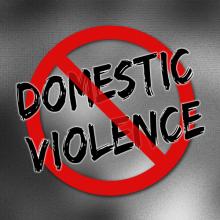
A caller into a Christian radio station was telling the hosts about some of the strains in her marriage. Soon, she was talking about the physical abuse she was receiving from her husband.
And the response of the hosts of this Christian radio show? “What are you doing that is making him so mad?”
There’s a sad history in too many Christian churches of pastors telling abused wives that their duty is, as one author noted, “to trust that God would honor her action by either stopping the abuse or giving her the strength to endure it.”
I don’t think that view is as common in churches as it once was. And in many churches pastors and other faith leaders will act thoughtfully and quickly to come to the aid of a victim of abuse. But the undercurrent of tolerating abuse lingers.
A renowned theology professor from the Southern Baptist Theological Seminary, Bruce Ware, preached a few years ago that when women refuse to submit to their husbands, men will sometimes respond with abuse. He did not condone that, but he seemed to accept it as inevitable.

For the sake of the world, we should all be feminists. And given what we know about the role of independent, empowered women in the community of disciples, for the sake world, we might be “Christians.”
Raymond Brown, the late, great scholar of John, writes: “In this Gospel, where light and darkness play such a role, darkness lasts until someone believes in the risen Jesus.”
Therefore no darkness, no heartbreak, no grief, no injustice can long stand where the Risen Christ is proclaimed. Jesus Christ is the light of the world. The light shines in the darknessa and the darkness does not — cannot — will not overcome the light.
New Abolitionists
Refuse to Do Nothing: Finding Your Power to Abolish Modern-Day Slavery, by Shayne Moore and Kimberly McOwen Yim, is a guide to how regular people, juggling the everyday demands of family and work, can become activists fighting human trafficking and slavery. IVP Books
Leaders of the Faith
Different writers pay tribute to the work and witness of Catholic sisters in Thank You, Sisters: Stories of Women Religious and How They Enrich Our Lives, edited by John Feister. These strong, faithful women are inspiring, no matter your tradition. Franciscan Media
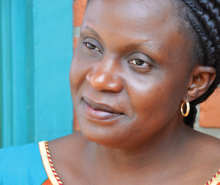
THE DEATH OF a college student who had been gang-raped in Delhi provoked outrage and anger. More than 2 million Indian students joined a movement to protest the rising violence against women in India. According to official data, reported cases of rape have more than doubled in the past 20 years, and women are the victims of a high proportion of other violent crimes.
But there's another side to this story. "Almost as shocking as the Delhi gang rape has been the range of voices that have sounded after it," wrote Sagarika Ghose, a TV journalist and commentator. "Patriarchy is chillingly omnipresent." Rather than blaming those who attack women, leaders in some Indian villages blame Westernization, liberal consumerism, growing individualism, or even the women themselves—because they wear "skimpy clothes," talk on mobile phones, and work outside the home, according to South Africa's Mail & Guardian newspaper.
For 19-year-old Kanika Sharma, these leaders miss the point. "It is all about the mentality of the boys," Sharma told the Mail & Guardian. "They think because they are men, they can do anything. But girls should get equal rights and opportunities."
Sharma speaks while standing under a sign that says: Being a woman should not make you feel vulnerable. But sadly, throughout the world women do feel vulnerable.
Before I traveled to the Democratic Republic of Congo (DRC)—described as the "rape capital" of the world—I studied reports on rape as a weapon of war. In the DRC rebel soldiers have brutally raped thousands of women. They know that if they rape enough women and girls, they can destroy the social fabric of an entire community.

Last Friday was International Women’s Day. It was a day of celebrating how far we’ve come, but also a reminder of how far we need to go.
I’m reminded of an experience I had with a member of my youth group a few years ago. We were volunteering for a social service project. A member of the group happened to be named Eve and we thought it was fun to play up the joke. I’d start greeting people, “Hi! I’m Adam,” and then Eve would chime in, “and I’m Eve!”
We always received the strangest looks, which, of course, is why we did it. But this time it was different. A man at the service project actually said,
“Oh. So you’re the one to blame.”
Eve was able to laugh it off and respond with grace, but I was pissed. I instinctively scowled at the man. It was a deep blow to me because, once again, religion was being used to put women down. But this time it was personal. Religion was being used to put down a member of my youth group.
Of course, religion hasn’t always been good to women. Or, maybe it would be better to say that religious men have used religion as a weapon to make women feel inferior. Whenever we blame someone else it’s a sign of our own weakness and insecurities. We don’t have the courage to deal with our own inner turmoil so we blame someone else. This is classic scapegoating and we men have been scapegoating women in this way since the beginning of human history. It’s pathetic. International Women’s Day is a reminder to me that women and men need to work together to end the religious bigotry against women.
My model for this is Jesus, my favorite feminist. [1]
So, in the spirit of International Women’s Day, I offer you the top 4 ways Jesus included women as full members of his posse.
OVER DINNER my friends and I reflected recently on the headlines that surprised us last year. A few were especially painful: former Rep. Todd Akin's comment that "legitimate" rapes do not lead to pregnancies; failed Senate candidate Richard Mourdock's comment that a pregnancy from rape is "something that God intended to happen"; and the Violence Against Women Act (VAWA), in effect since 1994, ending as the 112th Congress closed without reauthorizing it. All reminded me why the second edition of The Cry of Tamar: Violence Against Women and the Church's Response, by Pamela Cooper-White, is still needed almost 20 years since its first edition.
The Cry of Tamar reads as a graduate textbook on providing pastoral support for the victims of violence against women. It weaves pastoral counseling methods and social and psychological theories in dialogue with biblical exegesis and constructive theology to give clergy, pastoral caregivers, and religious leaders tools to help victims of violence and the larger Christ-community.
The story of Tamar, a girl raped 3,000 years ago in Jerusalem, frames and guides the book's goal of providing healing to the girls and women who are victims of violence today.
Advocacy, prevention, and intervention to stop violence against women have advanced since the 1995 first edition. Religious communities and congregations have become more informed about how to care and respond to both victims and perpetrators. But the need for increased awareness and education is ongoing. This second edition is an effort to update the conversation and keep it on the table.

As much as we like to believe we live in a safe country for women, we know this is not the case. Women and girls across the country are subject to rape, abuse, intimidation, and sex trafficking, with the number of victims growing each day.
Progress has been made over the past decades, thanks in part to the Violence Against Women Act. This policy protects women by providing everything from funding for rape crisis centers to increased collaboration with law enforcement to hold perpetrators accountable. VAWA is our country’s promise to women and girls that we will not allow them to be violated and abused.
The Violence Against Women Act is up for a vote in the Senate next week, and Americans from every corner of the country are calling our policymakers to reauthorize this important legislation. Since it was first passed in 1994, VAWA has received strong bipartisan support and shown its effectiveness in making communities safer, healthier, and better stewards of their resources (in the first 6 years since it was introduced, VAWA saved communities $12.6 billion).
VAWA expired in 2011, and has yet to be reauthorized.

I wonder if God reads the Bible. I mean, what we’re trying to do when we read the text is to understand it the way God understands it, right? I grew up in fundamentalist churches where biblical authority derived from the belief that God wrote it. I remember writing a paper at my Baptist college in which I said God “inspired” the authors to write what they had written; my Bible professor corrected me, saying God had inspired the text itself. I know he was just trying to fortify in me the doctrine of inerrancy. In this view, authority lies in God’s breathing of the Word, in what God meant when he wrote it. God speaks; we try to understand.
But what if God reads the Bible? And what if, as feminist Bible scholar Claudia Camp argues, scriptural authority “is always understood in relation to the authority of persons?" (p. 61) In one sense, this conclusion is inescapable. Paul’s second letter to Timothy may give us intra-biblical proof of the Bible’s own “inspiration,” but that’s a kind of circular reasoning, isn’t it? The Bible did not decide for itself what it was. By the time I wrote that college paper, Rodney Clapp’s book A Peculiar People had already opened my eyes to the very human process that gave us the Bible. It did not drop out of the sky like spittle from the mouth of God; the church drew water from the rivers of wisdom, put it in the containers of the old and new testaments, law, prophets, and Gospel, and discarded what the church deemed unnecessary. It was a messy, political process like any collective endeavor.
Each day, more women and girls are subjected to sexual slavery and trafficked against their will. Women are vulnerable to rape and violence at the hands of strangers on a bus or even by their own partners. And girls like Malala Yousafzai are targeted and shot for promoting girls’ right to education.
It’s time to stop the madness.
This Valentine’s Day, the One Billion Rising campaign will launch events around the world to call for an end to violence against women and girls. To raise awareness about this important issue, thousands of international flash mobs, rallies, workshops, and other creative protests are scheduled for V-Day.

When I was growing up, the only thing that could be said about clothing was that it should be “modest,” and ideally not too “worldly.” “Modesty” was proof-texted from 1 Timothy 2:9: “I also want women to dress modestly, with decency and propriety, not with braided hair or gold or pearls or expensive clothes.”
Not looking “worldly” usually meant not being too fashionable — neither dressing in accordance with what was popular in the mainstream nor wearing anything with strong counterculture associations: no skater pants for boys, no ripped jeans for girls. This is what was meant, apparently, by 1 John 2:15-17: “Do not love the world, or anything in the world.”
While it seems that fewer churches are pushing the second issue — except, perhaps, to offer OMG-wear and other Christian versions of whatever is popular — modesty continues to be a topic of interest. Most American Christian definitions of modesty involve “not showing too much skin.” The question of male lust is often a part of the discussion. But in context, that doesn’t seem to be what Paul is talking about at all: modesty, in 1 Timothy 2:9, is about not flaunting your wealth, which is a surprisingly important thing in the Epistles as well as the Gospels. Braids and gold and pearls have nothing to do with not looking like the other, non-Christian, worldly women. The opposite of “modest” is not “sexually provocative,” but “flashy.”
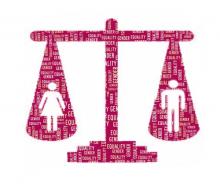
I consider myself a feminist, which means (to me at least) I support the elimination of barriers to access for all people, regardless of their gender. But in spite of that, the equality that follows such efforts comes with its own consequences for the culture, and sometimes even for the woman herself.
My wife, Amy, pastors a prominent church in downtown Portland. She has office hours, late-night meetings, and weekend commitments that keep her away from home quite a bit, sometimes more often than she’d prefer. I work most days from home as a writer, which means I have greater flexibility in my schedule to take the kids, pick them up, and sometimes make dinner or even put the little guys to bed. It’s not often that Amy gets home after both kids are asleep, but it happens. And when it does, I see the pain on her face.
Zoe, our four-year-old, had a dad’s night at her preschool this past week, at which they presented us with the requisite finger paintings and other artifacts of her classroom time. But my favorite thing was a letter that she dictated to her teacher for me. The very first sentence in the letter was as follows.
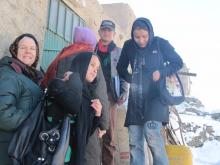
Kabul —Yesterday, four young Afghan Peace Volunteer members, Zainab, Umalbanin, Abdulhai, and Ali, guided Martha and me along narrow, primitive roads and crumbling stairs, ascending a mountain slope on the outskirts of Kabul. The icy, rutted roads twisted and turned. I asked if we could pause as my heart was hammering and I needed to catch my breath. Looking down, we saw a breathtaking view of Kabul. Above us, women in bright clothing were navigating the treacherous roads with heavy water containers on their heads or shoulders. I marveled at their strength and tenacity. “Yes, they make this trip every morning,” Umalbanin said, as she helped me regain my balance after I had slipped on the ice.
About 10 minutes later, we arrived at the home of Khoreb, a widow who helped us realize why so many widows and orphans live in the highest ranges of the mountain. Landlords rent one-room homes at the cheapest rates when they are at this isolating height; many of the homes are poorly constructed and have no pipes for running water. This means the occupants, most often women, must fetch water from the bottom of the hill each and every morning. A year ago, piped water began to reach some of the homes, but that only meant the landlords charged higher rent, so women had to move higher up the mountain for housing they can afford. It only made their daily water-carrying longer and more arduous.
TAMAR’S LIFE COULD have been different. A princess of David’s kingdom, she would have married into a wealthy family. But that all changed with the only recorded event of her life, described in 2 Samuel 13: A family member forced himself on her, then turned her out of his room. She cried aloud for all to hear, but the one person who did hear, her brother Absalom, counseled her to not take what happened “to heart.”
Rarely preached from the pulpit, this is a story that needs to be heard, because what happened to Tamar happens to one in three women and girls today. They are our mothers, sisters, aunts, daughters, selves—women and girls harmed by violence and silence. Worldwide, violence against women and girls takes many forms: sexual violence, sexual harassment, trafficking, “honor killings,” and other forms of murder. Such violence distorts the image of God that is in all of humanity. Victimization is never God’s will—fullness of life is. The church needs to help create intentional safe spaces so that healing can begin.
On Feb. 14, 2013, a movement of grassroots, national, and international organizations in more than 170 countries will take part in One Billion Rising, a day of action to reveal the collective strength and solidarity of those who demand an end to violence against women. Initiated by V-Day, the advocacy group founded by Vagina Monologues playwright Eve Ensler, this event invites the world to rise up to stop violence toward women and girls.
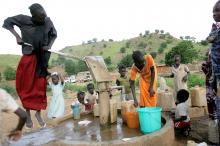
On my desk, next to my laptop, is a can of seltzer water. My grapefruit-flavored, bubbly water sits about four inches away from my left hand as I write. When the can is empty, I might take another from the fridge or fill up a water bottle at the kitchen sink.
Water drives my day, but I rarely think about it. I cook pasta in it. I heat water to make tea. I fill a bucket to mop the floor and a draw a bath with hot water and soak in it. At the moment, my dishwasher is growling away, and I’m waiting to hear the pleasant beep that alerts me that the clothes in the washer downstairs are clean.
I’ve never considered water a women’s issue. Not until this past week, that is. On Friday, the day before World AIDS Day 2012, I had the privilege of attending World Vision’s Strong Women, Strong World luncheon in New York City. Strong Women, Strong World is a new initiative “supporting sustainable change in some of the difficult places in the world to be a girl or a woman.” The focus of the day was water.
The Honorable Melanne Verveer, U.S. Ambassador at-large for Global Women’s Issues, spoke at the event. She celebrated the progress humanitarian organizations such as World Vision have made in the effort to eradicate HIV/AIDS, but reminded us that the number of people living with HIV is at an all-time high. In 2010, HIV/AIDS killed 1.8 million people. Sixty percent of those living with HIV are girls and women, and AIDS is the leading cause of death of women of reproductive age (15-44 years old) globally.
“HIV,” Ambassador Verveer said, “has the face of a woman.”

I’ll preface this piece my saying I know I am making some broad generalizations based on gender, and that there are always exceptions to every trend. But despite that, I do think there are some cultural trends that can offer us some useful insight.
Anyone who has been paying attention has noticed that, of those left within the walls of most churches, the majority still hanging in there are women. Some, like the advocates of so-called Masculine Christianity, see this as a crisis. The Christian faith and its symbols are becoming softened, feminized, compromised into being something other than what they were meant to be.
Granted, when you take a faith whose principal authors historically have been men and then place that same faith in the hands of women, some things will inevitably change. Personally, I welcome the exploration of other, feminine expressions of the divine and values such as embodied spirituality that many female Christian leaders value. But aside from these assets, I think that women bring something far more critical to institutional religion.
Without them, it may cease to exist.
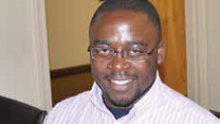
Bio: Executive Director, Padare/Enkundleni Men's Forum on Gender in Harare, Zimbabwe — www.padare.org.zw
1. How are women working for gender equality in Zimbabwe? We have a very strong women’s movement in Zimbabwe. We have the Women and AIDS Support Network. We have the Campaign for Female Education, an organization doing wonderful work giving grants to girls so that they stay in school. We have another organization that deals with violence against women; there are no government-provided shelters for battered women in Zimbabwe. There are organizations for young women, for women in rural communities—I could go on and on.
2. “Padare” and “Enkundleni” mean “meeting place” in Zimbabwe’s Shona and Ndebele languages. What does Padare work to do? We are not bringing a new agenda to the table; we are saying, let’s look at all of these women’s organizations and the issues they’re bringing—violence against women, access to education, access to reproductive health, HIV and AIDS. What can men do? Perpetrators of violence against women are men. Men can make a personal commitment of not being violent against their partners. That’s a political statement, but from a very personal perspective. So the feminist slogan that “the personal is political” is equally applicable to men.
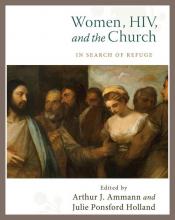
EXCLUDING WOMEN from leadership weakens the commitment and contributions of churches, theological institutions, and the global church in their participation in God's prophetic mission. It translates to women's priorities and specific needs being inadequately articulated and under-resourced.
For instance, matters of sexuality, reproductive health education, and justice are hardly ever discussed in churches or theological institutions, except when governments want to legalize abortion. Similarly, little attention is given to maternal health care despite the high rates of maternal death and infant mortality in Africa. It is not enough for churches to focus on baptizing children, blessing them, and welcoming them into the house of God when they neglect to care for their well-being from the time they are in their mothers' wombs, especially now that so many children are born HIV-infected. Responsible and healthy sexuality, childbearing, and parenting are matters that require full engagement of both women and men, and the churches should be at the forefront of providing much-needed education.
Women have been left to shoulder the burden of the times: preventing HIV transmission, facing HIV-related stigma, handling deaths, and addressing the myriad other adverse impacts that the HIV pandemic has created. Similarly, in the Circle of Concerned African Women Theologians, of which this author is a founding member, women have provided leadership in naming theological, ethical, cultural, and religious beliefs, as well as harmful practices and leadership styles, that fuel gender disparity, social injustices, and the spread of HIV in religious communities and in society at large. The Circle also has endeavored to provide theological and ethical reflections that are empowering and transformative to the behaviors contrary to God's will for how women and men relate to each other in families, religious contexts, and everyday life.

Oh, ladies. Just when you thought we were emerging again from the sudden backtrack into 20th-century gender politics, this happened. (Before continuing, I warn: this is the most offensive bit of so-called Christian, “red pill” patriarchy that I have ever read.)
A blog post written on the website of the Christian Men's Defense League — yes, an organization dedicated to protecting the rights of white American Christian men is apparently a thing — blames Mitt Romney's loss Tuesday night on what the author brilliantly coins "the slut vote."
Hat tip to Gawker for finding the cached version of this post, as it was quickly locked down post-publishing. You can view snippets of all of author “BSkillet’s” witticisms HERE.
Most disturbing in this man's tirade against so-called "sluts" — and trust me, there's a lot in there to creep us out — is that he is doing so from a Christian perspective. The banner of the blog cites Psalm 144:1, "Blessed be the LORD, my rock, Who trains my hands for war and my fingers for battle."
The verse of choice is interesting, to say the least. I usually cringe when I hear terms like "war on religion," "war on women," etc., but if anyone is waging it, it's this guy.
There is so much here that completely defies logic, but I thought I'd pull out a couple of gems for our review.
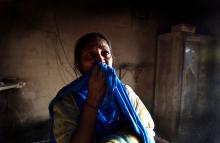
When the United States dropped atomic bombs on the Japanese cities of Hiroshima and Nagasaki in 1945, the world was ushered into a period of weapons paranoia. The Cold War, of course, was hallmarked by the obsessive weapons one-upmanship of the United States and the Soviet Union.
Who, then, would have thought that in the 21st century, the seeming weapon of choice would not be some sort of super-nuclear missile or an ultra-deadly biological toxin, but that it would, instead, be women?
“Women are being used as weapons of terror,” Dr. Rubina Greenwood told an audience last week at a congressional briefing on the rights of minority women in Pakistan organized by the Hindu American Foundation.